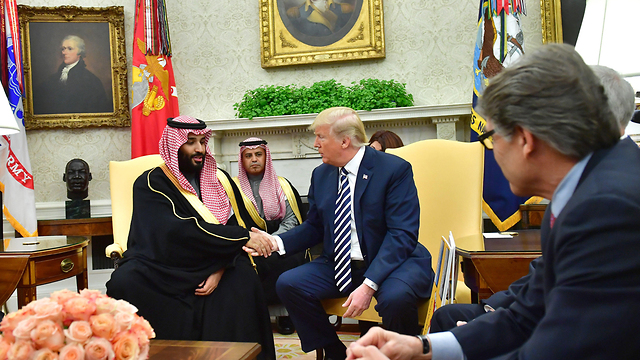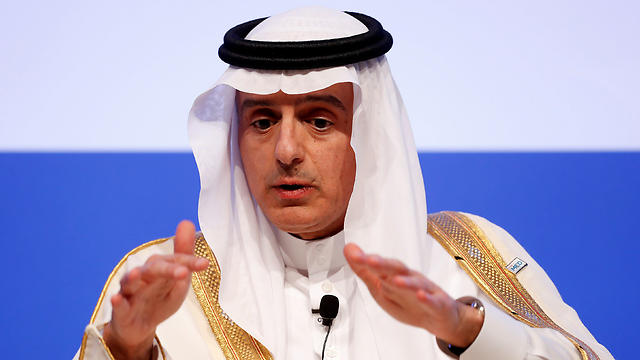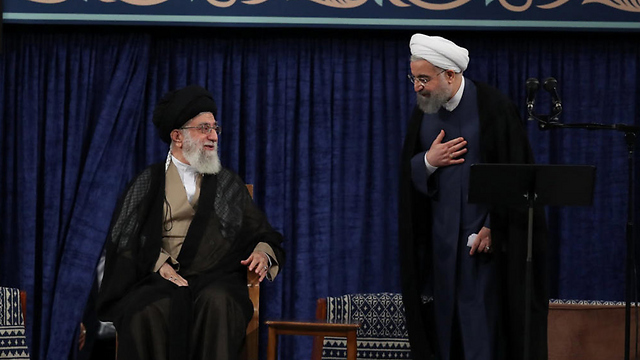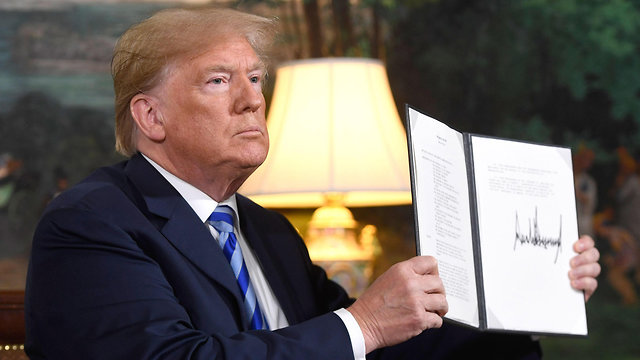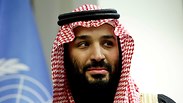
Saudi Crown Prince Mohammed bin Salman
צילום: רויטרס
Gulf Arab allies hail triumph after US quits Iran deal
Saudi Arabia, the United Arab Emirates (UAE) and Bahrain strongly back US President's Trump's decision to pull out of the Iran nuclear agreement, saying renewing sanctions may disrupt their ballistic missile program and support for militant groups; Saudi Arabia, meanwhile, warns Iran: if you get nukes, so will we.
Saudi Arabia and its Gulf allies basked on Wednesday in what they saw as a political victory over Iran, their rival for regional influence, after Washington withdrew from the international nuclear accord with Tehran.
Saudi Arabia, the United Arab Emirates (UAE) and Bahrain swiftly backed US President Donald Trump's decision to reimpose sanctions on Tehran, reflecting their concern about Iran's ballistic missile program and support for militant groups.
"Paris and London may not like Trump's decision, but how would the French or British feel if their capital cities came under direct threat by the Iranians?" editor-in-chief Faisal Abbas wrote in Saudi Arabia's English-language Arab News daily next to a headline that read: "The deal is dead."
In a coffee shop, Saudi businessman Ziad said the kingdom's leadership was correct to challenge a deal that had eased sanctions in exchange for Tehran taking measures that would prevent it being able to make a nuclear weapon.
"Every couple of days, we have missiles coming from Yemen and we see evidence that they are made by Iran ... It is interfering in Syria, Yemen, Morocco. Other countries may accept that, but here in Saudi Arabia we don't," he said.
An hour later, at least four loud blasts rocked Riyadh. Authorities said they had intercepted two ballistic missiles fired from Yemen, where a Saudi-led coalition is fighting to oust the Iran-aligned Houthi movement from the capital and large parts of the country.
A nuclear warhead mounted on one of those, Saudi Arabia knows, will devastate the country.
Saudi Foreign Minister Adel Al-Jubeir warned Thursday his country will peruse nuclear weapons should Iran make true on its threats and do the same.
"If Iran acquires nuclear capability we will do everything we can to do the same," he said in an interview with CNN, echoing an assertion made by Saudi Crown Prince Mohammed bin Salman just two months before, in which he compared Iran's Supreme Leader Ayatollah Ali Khamenei to Adolf Hitler.
It was long feared that, more than the destruction an Iranian nuke may cause, it could spark a nuclear arms race in one of the most volatile regions in the world.
"These missiles are Iranian manufactured and delivered to the Houthis. Such behavior is unacceptable. It violates UN Resolutions with regards to ballistic missiles. And the Iranians must be held accountable for this," Jubeir told CNN.
"We will find the right way and at the right time to respond to this," he warned. "We are trying to avoid at all costs direct military action with Iran, but Iran’s behavior such as this cannot continue. This amounts to a declaration of war."
Proxy wars
The Sunni Muslim kingdom has been at loggerheads with Shi'ite Iran for decades, fighting a long-running proxy war in the Middle East and beyond that has influenced conflicts in Iraq, Syria, Lebanon and Yemen.The Saudi Foreign Ministry accused Iran of using economic gains from the lifting of sanctions to develop ballistic missiles and support militants. It called for a "comprehensive view that is not limited to its nuclear program but also includes all hostile activities".
Anwar Gargash, UAE Minister of State for Foreign Affairs, tweeted that Iran had been emboldened by the nuclear deal, and "its ballistic missile program became both offensive & exportable".
Trump has employed similar arguments, criticizing the accord for failing to address Iran's ballistic missile program, its nuclear activities beyond 2025, or its role in regional wars.
"He is supporting us not because we are Saudi Arabia or because we have oil, but because he thinks we are right," said Mohammed, another Saudi businessman.
Oman, which orchestrated secret US-Iran contacts that helped pave the way for the deal in 2015, was more measured.
"We believe the United States and the Islamic Republic of Iran are interested in realizing peace and stability in the region, and the choice of confrontation is not in the interest of either side," its foreign ministry said.
Kuwait said in a statement that it "understands and respects" Trump's decision.
Qatar, locked in a dispute with Saudi Arabia and other Arab states, meanwhile cautioned against a potential nuclear arms race in the region.
"It is in the interest of all parties to exercise restraint, wisdom and patience and to try to resolve differences through dialogue," its foreign ministry said.
Saudi Arabia, the UAE, Bahrain and Egypt imposed a trade and transport boycott on Qatar in June, accusing it of financing militant groups and cozying up to Iran—charges it denies.
'Sinister activities'
"The Omani, Qatari, and Kuwaiti governments have all sought to maintain pragmatic relations—economic more than political—with Iran," said Kristian Coates Ulrichsen from the Texas-based Rice University's Baker Institute."There is likely to be a feeling of jubilation in Riyadh and Abu Dhabi that the Trump administration - or at least the White House - has now come round to their thinking on Iran's threat to regional security."
In his speech on Tuesday, Trump condemned Iran's "sinister activities" including backing armed Islamist groups such as Hezbollah in Lebanon and Hamas in the Palestinian Gaza Strip.
Abdulaziz al-Sager, head of the Jeddah-based Gulf Research Centre, said the message was significant in that it reflected Gulf concerns. "We've always said our concern about this agreement in 2015 was that Iran should not take it as 'carte blanche' to go and expand its territorial influence."
Saudi Crown Prince Mohammed bin Salman, who serves as Saudi defense minister, told CBS News in March that his country would "without a doubt" develop nuclear weapons if Iran did so.
In an interview with CNN on Wednesday, Saudi Foreign Minister Adel al-Jubeir said: "We have made it very clear that if Iran acquires a nuclear capability, we'll do everything we can to do the same."
Iran had ruled out renegotiating the accord and threatened to retaliate if Washington withdrew.
It could do so by undermining the interests of Washington and its allies in the Middle East, perhaps by increasing support for Yemen's Houthis. The Saudi Arabia and Emirati forces fighting the Houthis both receive military backing from the United States and other Western allies.
"There is a real risk of escalation, especially between Iran and Israel. While the Gulf States may want to see the US and Israel try to cut Iran to size, I don't think they want to get dragged into a direct confrontation themselves. The consequences could be severe," said Joost Hiltermann, Program Director, Middle East and North Africa at the International Crisis Group.










